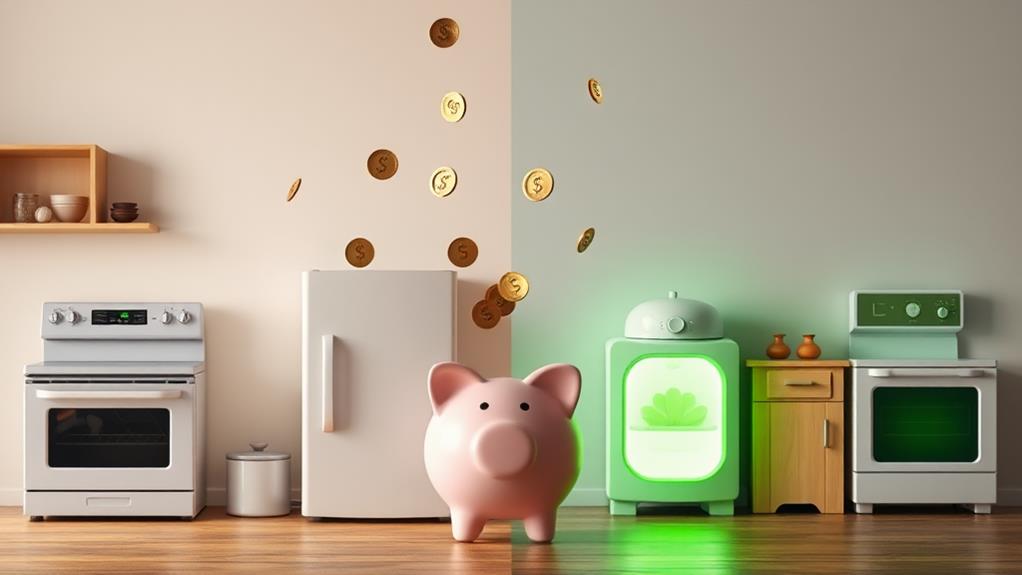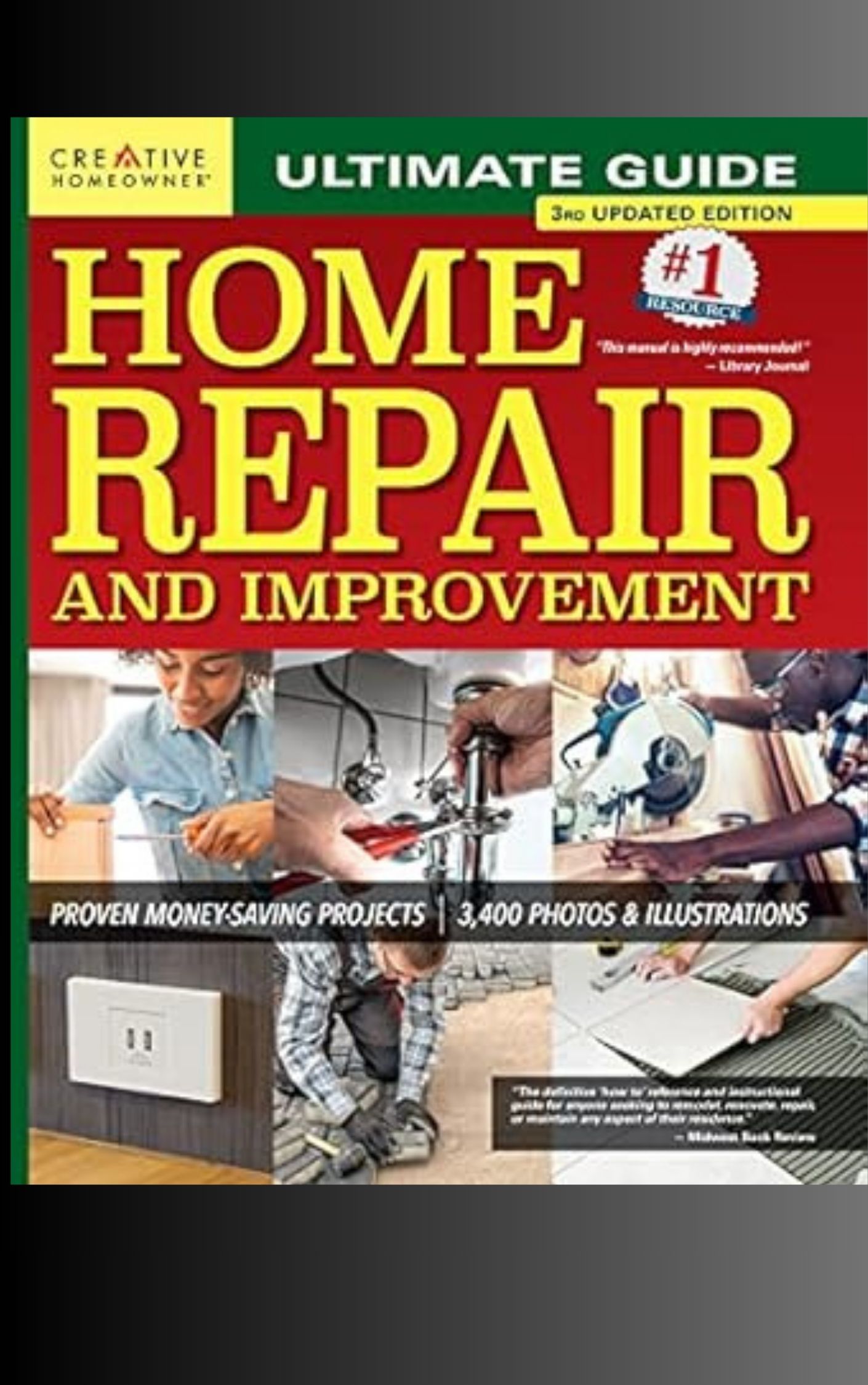When choosing between budget and energy-efficient appliances, you'll face a trade-off between upfront costs and long-term savings. While energy-efficient models typically cost 10-30% more initially, they can save you hundreds of dollars in energy bills over their lifespan. Energy Star certified appliances use 10-50% less energy than standard models, reducing your carbon footprint. Budget appliances may seem cheaper at first, but they often require more frequent repairs and replacements. Energy-efficient models generally last longer, with many boasting 10-15 year lifespans. To make the best decision, consider your budget, usage patterns, and environmental impact. The true cost extends far beyond the price tag.
Upfront Costs Comparison
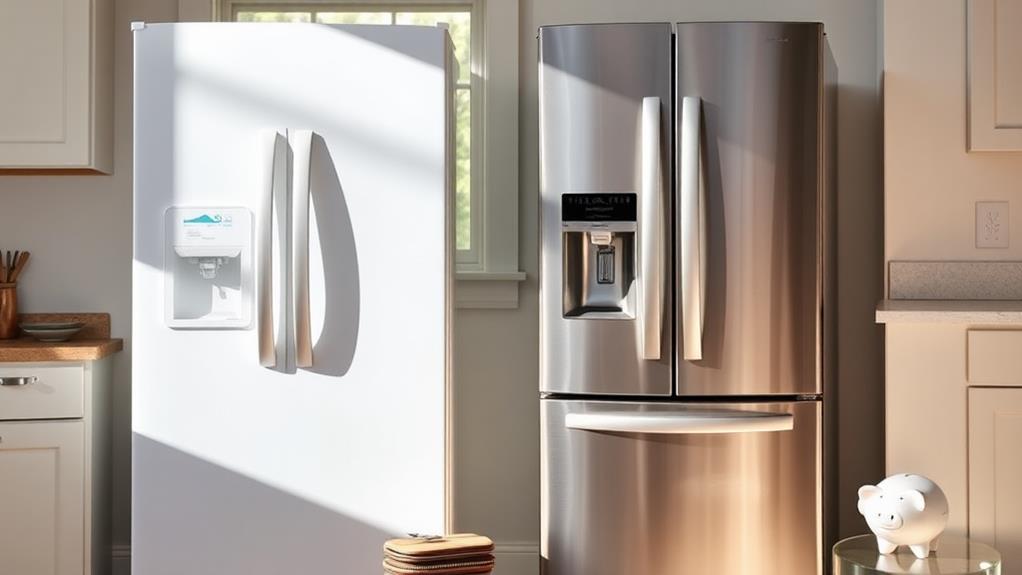
When comparing budget and energy-efficient appliances, the most noticeable difference lies in their upfront costs. You'll find that energy-efficient models typically come with a higher price tag, often 10-30% more expensive than their budget counterparts. This initial investment can be a deterrent for many consumers, especially those on tight budgets or with immediate financial constraints.
However, it's crucial to look beyond the sticker price. While budget appliances may seem like a bargain, they often use outdated technology and less efficient components. Energy-efficient appliances, on the other hand, incorporate advanced features and materials designed to minimize energy consumption.
When shopping, you'll notice that energy-efficient appliances display Energy Star labels or other efficiency ratings. These certifications can help you compare the potential long-term savings between different models. It's worth considering that the higher upfront cost of an energy-efficient appliance is an investment in future savings.
To make an informed decision, factor in your budget, expected usage, and the appliance's lifespan. Remember, the true cost of an appliance extends far beyond its purchase price.
Long-Term Energy Savings
While the upfront costs of energy-efficient appliances may be higher, their long-term energy savings can be substantial. You'll notice the difference in your monthly utility bills almost immediately. Energy Star certified appliances use 10-50% less energy than standard models, translating to significant savings over time.
For example, an Energy Star refrigerator can save you $300 in energy costs over its lifetime. A certified washing machine can save up to $370 in energy and water costs. These savings add up across all your appliances, potentially reducing your annual energy bill by hundreds of dollars.
You'll also benefit from improved performance and durability. Energy-efficient appliances often incorporate advanced technologies that enhance their functionality and lifespan. This means you won't need to replace them as frequently, further increasing your long-term savings.
Consider the environmental impact too. By using less energy, you're reducing your carbon footprint. Many utility companies offer rebates or incentives for purchasing energy-efficient appliances, which can offset the initial higher cost. When calculating the true cost of an appliance, factor in these long-term savings to make an informed decision.
Environmental Impact Assessment
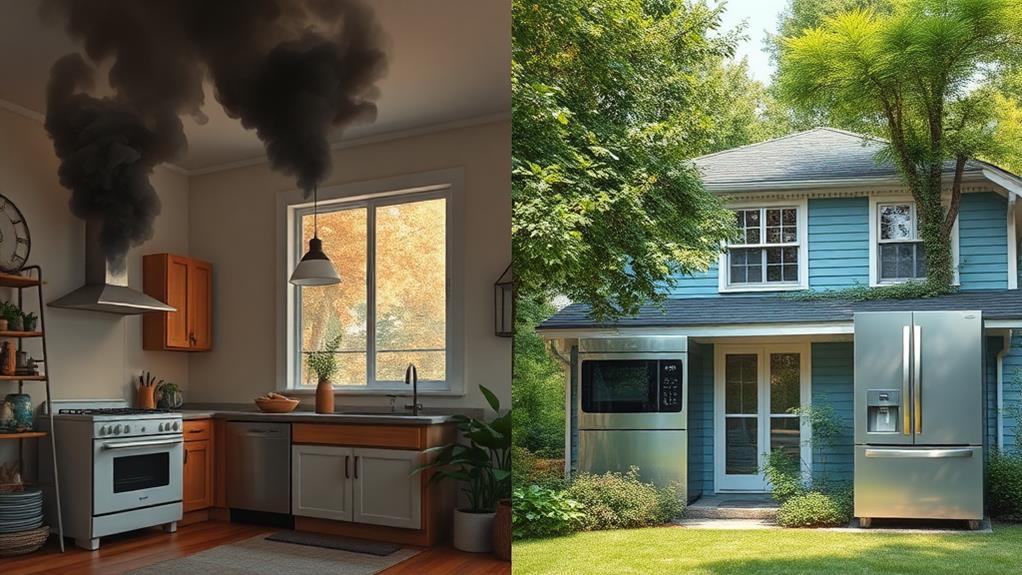
Beyond financial considerations, the environmental impact of your appliance choices is a key factor to weigh. Energy-efficient appliances significantly reduce your carbon footprint by consuming less electricity or gas. This translates to lower greenhouse gas emissions from power plants and reduced strain on natural resources.
When you opt for budget appliances, you're often choosing models with higher energy consumption. Over time, these appliances contribute more to air and water pollution, as well as increased waste generation. Energy-efficient models, on the other hand, often incorporate eco-friendly materials and manufacturing processes.
Consider the lifecycle impact of your appliances. Energy-efficient models typically have a longer lifespan, reducing the frequency of replacements and associated waste. They're also more likely to be recyclable at the end of their useful life.
Water consumption is another crucial factor. Energy-efficient washing machines and dishwashers use significantly less water, helping conserve this vital resource. By choosing these appliances, you're not just saving on utility bills but also contributing to water conservation efforts in your community.
Repair and Maintenance Expenses
Considering the long-term costs, repair and maintenance expenses play a crucial role in the budget vs. energy-efficient appliance debate. While budget appliances may seem like a bargain upfront, they often require more frequent repairs and have shorter lifespans. This can lead to higher cumulative costs over time.
Energy-efficient appliances, on the other hand, are typically built with higher-quality components and advanced technology. They're designed to last longer and operate more reliably, which means you'll likely spend less on repairs and replacements. However, when these appliances do need servicing, it can be more expensive due to their complex systems.
You'll want to factor in the availability and cost of spare parts for both types of appliances. Budget models might've cheaper parts, but they may become obsolete quicker. Energy-efficient appliances often have better warranty coverage, which can offset potential repair costs.
To make an informed decision, research the average lifespan and common issues for specific models you're considering. Remember, the true cost of an appliance extends far beyond its initial price tag. Regular maintenance can help extend the life of any appliance, regardless of its efficiency rating.
Lifespan and Replacement Frequency
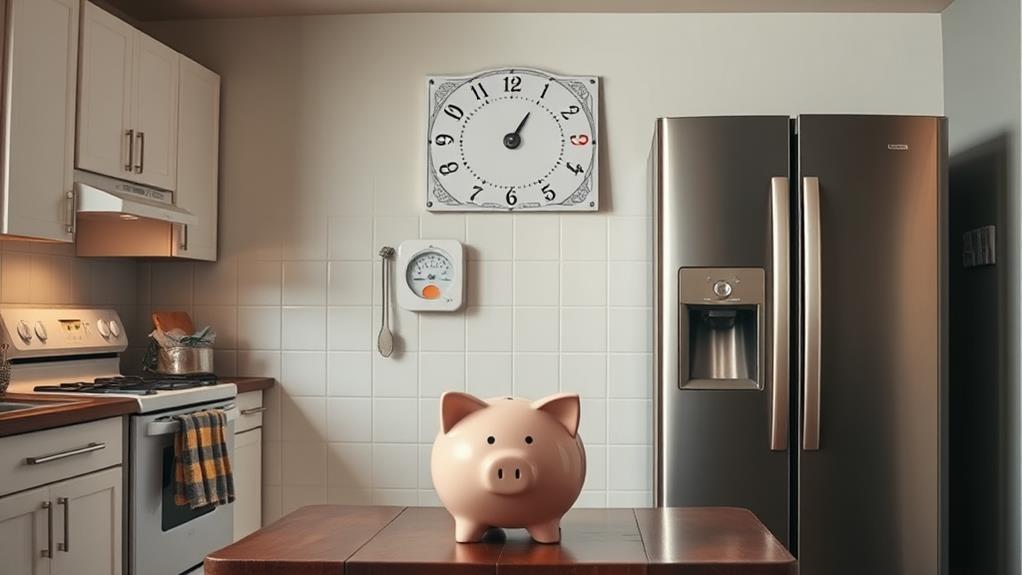
Longevity is a key factor when weighing budget appliances against their energy-efficient counterparts. You'll often find that energy-efficient models have a longer lifespan, which means you won't need to replace them as frequently. This extended durability can offset their higher initial cost over time.
Budget appliances typically have a shorter lifespan, sometimes lasting only 3-5 years before needing replacement. In contrast, energy-efficient models can often last 10-15 years or more. This difference in longevity means you might replace a budget appliance two or three times before an energy-efficient model needs replacing.
When you factor in the cost and hassle of more frequent replacements, energy-efficient appliances can prove more economical in the long run. They're built with higher-quality components and advanced technologies that contribute to their durability. Additionally, manufacturers often offer longer warranties on these models, reflecting their confidence in the product's lifespan.
Consider your long-term plans when making a decision. If you're planning to stay in your home for many years, investing in energy-efficient appliances could save you money and reduce the inconvenience of frequent replacements.
Government Incentives and Rebates
Many governments offer incentives and rebates to encourage the purchase of energy-efficient appliances. These programs can significantly offset the higher upfront costs of energy-efficient models, making them more affordable for you. Check with your local and national authorities to see what incentives are available in your area.
Common types of incentives include tax credits, cash rebates, and low-interest loans. You'll often find these for appliances with ENERGY STAR certification or other recognized energy-efficiency standards. Some utilities also offer rebates or discounts on your energy bill when you buy qualifying appliances.
To take advantage of these incentives, you'll need to research the requirements and application processes. Keep all receipts and documentation related to your purchase, as you may need to submit them for reimbursement. Be aware that incentive programs can change or expire, so it's best to act quickly when you find a suitable offer.
Conclusion
You've seen how energy-efficient appliances, like a smart investment, pay off over time. They're pricier upfront but slash your energy bills and carbon footprint. You'll face fewer repairs and replacements, too. Don't forget about those sweet government incentives! When you crunch the numbers, it's clear: choosing energy-efficient appliances is like planting a money tree in your home. Your wallet and the planet will thank you for years to come.
